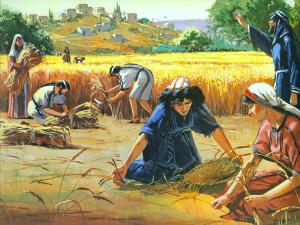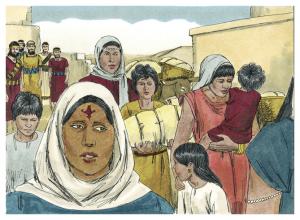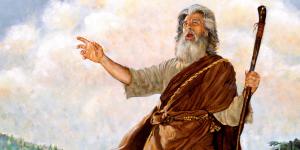
There are different opinions on whether the story of Jonah was a criticism of Jewish exclusivism after the Exile. (See this post) But that’s the way an early Christian community (and the Jesus of Luke’s Gospel) interpreted it. God’s favor goes to a foreign, even hostile, people, regardless of what Jonah wants. I imagine Jesus using this story in the discussion on the way to Emmaus and interpreting it the same way. I’ll get to Jesus and the Sign of Jonah after the story.
Episode 11 in Opening the Scriptures on the Way to Emmaus: Why Messiah had to Suffer. Introduction and links to other posts in the series here.
The Book of Jonah, in the tense situation of post-Exile Jerusalem, is the Bible’s comic relief. For humorous effect I’d say it even tops the fig leaves that Adam and Eve tried to cover themselves with in the garden. But the story includes a sharp dig. The author must have known he was touching on some sore points, especially with Ezra pursuing a kind of identity politics. He deliberately used humor and the style of a tall tale to bemuse his audience and then tell of God’s compassion..
Jonah, the contrary prophet
Jonah is a prophet whom God commissions to warn the citizens of Nineveh that God is about to destroy them for bad behavior. In the story, Nineveh is the larger-than-life-size capital of Assyria. The time had long passed (but no Jew could forget) when the Assyrians demolished the Northern Kingdom of Israel. They also exacted exorbitant tribute from Judah in the South as a price for its survival. To the Jews Assyria was a hated Evil Empire.
Jonah feels the same way. Rather than take a chance that the Ninevites might repent and God would spare them, he takes off in the opposite direction on a ship bound for Spain. God whips up a storm, and the ship’s captain has everybody draw straws to see which one has offended his god. (It was a big storm so it needed a big explanation.) Jonah gets the short straw and lets the others throw him into the sea. Immediately the storm calms. A big fish swallows Jonah at God’s command and three days later vomits him out on the shore.
Much chastened, Jonah goes and starts the three-day walk across Nineveh. (Everything’s big in this story.) “Forty days more and Nineveh shall be destroyed.” As Jonah feared, the people do repent. Everyone from the king to the lowest peasant puts on sackcloth and sits in ashes—which is a lot of sackcloth and ashes. Everybody fasts, including the animals; and God relents from the punishment he threatened.
Jonah goes off in a huff and sits down in the hot sun outside the city and waits to die. But God gives him shade with a giant cucumber plant that grows up overnight. (I told you it’s a tall tale.) Jonah is happy about the plant, but then God destroys it with a voracious worm. Again Jonah wants to die. Finally God speaks:
You are concerned over the plant which cost you no labor and which you did not raise; it came up in one night and in one night it perished. And should I not be concerned over Nineveh, the great city, in which there are more than a hundred and twenty thousand persons who cannot distinguish their right hand from their left, not to mention the many cattle?” (Jonah 4:10-11)
Jesus and the Sign of Jonah
Authorities have been dogging Jesus to show them a sign from heaven. Does this make any sense? Jesus has just cured a man of his inability to speak by casting out a dumb demon. What better sign could you want? But they insist, “By the power of Beelzebul he casts out demons.” (Matthew 12:24)
Jesus knows what is bugging the questioners. A healing miracle isn’t just a kind deed of extraordinary power. It’s a challenge to anyone who wields power in the ordinary way. It de-centers authority—not the kind of sign Jesus’ critics are hoping for. Jesus’ signs might very well seem to them to be the work of the devil, sowing seeds of chaos into a system that’s hard enough to keep going as it is. They challenge Jesus to give a sign like the one the devil holds out to Jesus in the temptation story. Jesus could throw himself down from the top of the Temple and have the angels bear him up.
Jesus has no intention of giving any sign from heaven. He says point blank in the Gospel of Mark, “No sign will be given this generation.” That much, I’m guessing, is an accurately preserved memory. By the time we get to the Gospels of Luke and Matthew, some early Christians have added to Jesus’ words: “Except the sign of Jonah.” Both Gospels go on to describe the sign. (Matthew 12:38-42; Luke 11:29-32)
Deciding between Matthew and Luke
Here the interpreter has a problem because the Jonah story has three major scenes; and Matthew and Luke interpret differently. Matthew has Jesus referring to two of the episodes:
- the storm at sea with the three days in the belly of the fish and
- the preaching to Nineveh with the repentance of its people.
Luke only mentions the events in Nineveh. Which of these is the actual sign of Jonah?
The “sign of Jonah” part of the story comes to us, some scholars say, by way of the early Christian community that wrote Q, a hypothetical lost source of Jesus’ sayings that both Matthew and Luke relied on. The same scholars tell us that Luke’s version is probably closer to the original Q than Matthew’s. (See Richard A. Edwards, The Sign of Jonah.)
In Matthew Jesus connects Jonah’s three days in the fish to his own predicted three days in the tomb. Jesus rises from the tomb as Jonah “rose”out of the belly of the fist. That part doesn’t occur in Luke. For Luke the sign of Jonah is God’s favor to the Ninevites after Jonah’s preaching.
To my mind this latter makes more sense than Jesus’ rising as a sign “to this generation.” After all, only a few of Jesus’ followers saw Jesus after the resurrection (well, more than a few according to Paul). But anyone could see – and more than a few objected to – the way Christians were extending God’s favor. They welcomed Gentiles as well as Jews into their communities.
Luke quotes Jesus:
At the judgment the men of Nineveh will arise with this generation and condemn it, because at the preaching of Jonah they repented, and there is something greater than Jonah here. (Luke 11:32)
Placing ourselves in the story
We can read the Jonah story and take comfort: God is always ready to forgive us “Ninevites.” But what if, instead of reading the story, we heard the story from Jesus’ lips? What if this were one of the stories Jesus interpreted on the way to Emmaus? Would Jesus put himself in the role of the forgiving God in the story?
Jesus is more than the Great Comforter. God is more than one who forgives always. Jesus, in this story, actually identifies with all the sinners of this world, especially the most hated, to lift them up. The Ninevites will rise up at the judgment and condemn “this generation.” They will rise up with Jesus. So we really have to place Jesus with the people of Nineveh. And Jesus isn’t giving comfort at this point, certainly not to Jonah.
The real trick in interpreting this story is to place ourselves in it. The apostles had to figure that out, too. I’m guessing that they, like us, would have preferred to see themselves as the Ninevites, sinners who repent and receive God’s mercy. Thinking about their cowardly behavior during Jesus’ trial and crucifixion, they would have been very aware of their own failure, and hoping for God’s forgiveness.
At some point, I think, the apostles had to look deeper—to see themselves as “Jonah”s. They had acted like Jonah when they tried to keep children away from Jesus or wanted to stop someone from driving out demons because “he was not following us” or argued about who would be greatest in Jesus’ kingdom. Not so different from the Pharisees—or us, imagining God makes the same distinctions we do. In this story Jesus is the Ninevites, and we are Jonah.
Jesus identified with the “Ninevites” of his day, those rejected by the self-righteous “Jonah”s. For this, I believe, Jesus was sent, and for this he was executed. It could hardly have been different.
If that’s what Jesus explained to the disciples on the way to Emmaus, there is still one thing missing: How does this amount to good news, as it must have done for the disciples? Their hearts were burning within them even before they knew that it was Jesus risen from the dead. The next post will conclude the series with some guesses about this last question.
Image credit: Tenthill Baptist church via Google Images












